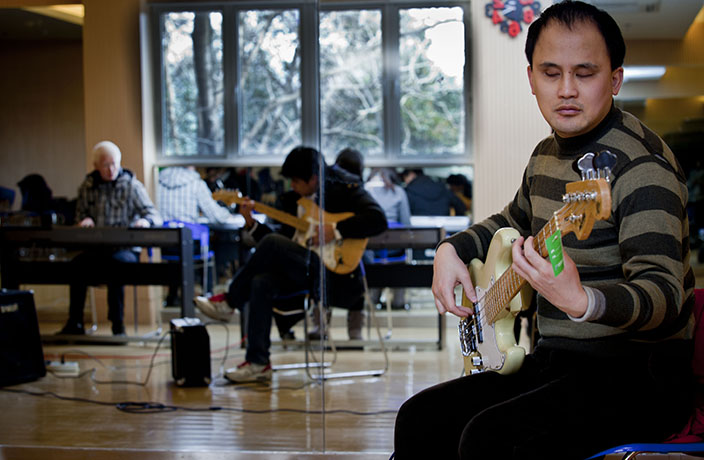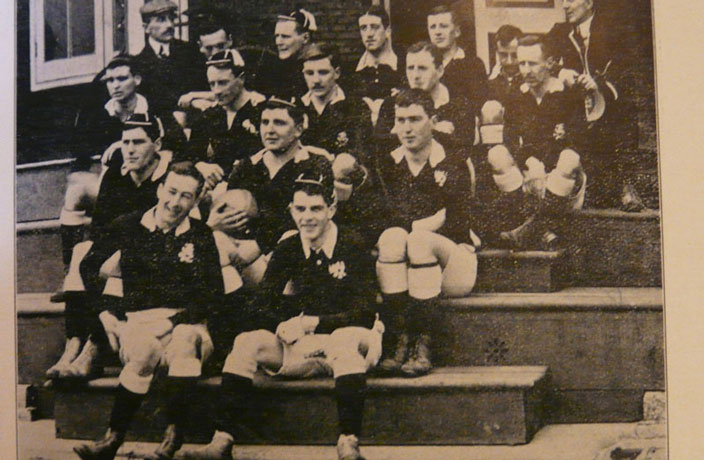Throwback Thursday is when we trawl through the That's archives for a work of dazzling genius written at some point in our past. We then republish it. On a Thursday.
By Celine Song
Han Wenyu, a 44-year-old Shanghai native, suffered a fall at age 6 that damaged his spine and left him permanently unable to walk. Local schools were unequipped for a disabled child and declined to accept him. He lived across the street from an elementary school, and it was agony to watch other children go in and out of the gate every day.
Today, Han is an accomplished electronics technician and Para Games athlete – achievements that wouldn’t have been unlikely without the exceptional support of his family, who home-schooled him. Han got his career off the ground by enrolling in an electronics correspondence course. On exam days his father had to carry him to the third-floor testing room on campus.
“Few students were disabled so I don’t blame them for not thinking about an elevator when they chose the place,” Han says. “Besides, we didn’t really have much accessibility equipment in Shanghai back then.”
The plight of people with disabilities in Shanghai is perhaps best illustrated by their invisibility. With the exception of beggars and the elderly, wheelchairs are a rare sight on Shanghai streets. Public access and services are gradually improving - it was only in 2010 that Shanghai started issuing licenses for disabled drivers - but gainful employment and independence remain difficult to attain. Luckily for some, community-minded non-profits have provided networking opportunities where people can meet, mingle and work together toward self-sufficiency.

After finishing his university course, Han taught himself to repair more things. Over the next six years, he self-educated and obtained certification to repair clocks, cell phones and various other electronics. He once won third place in a national skills competition for the disabled.
In 1992, Han began repairing things for people in the neighborhood. Due to mobility issues, it made sense to work close to home, plus customers were familiar with Han and his family. He charged less than most repair shops, and the China Disabled Persons’ Federation paid him RMB10 on top of what he earned from each job. Thus he was able to earn about RMB1,000 a month, not bad considering monthly minimum wage was RMB270.
In 1995, Han started training in riflery. In 2006, he took fourth place at the national Para Games. Han had to discontinue shooting because the Shanghai paralympic training center lacked proper storage for rifles so practicing there was banned. He switched to fencing and took home a gold medal at the national Para Games last year.
“It was a life-altering experience to see people like me making all those excellent achievements at the Para Games.”
The Games have been a source of empowerment and inspiration for many disabled Chinese. Han says he quit caring about people staring at him in the street after he started paying attention to the games.
“It was a life-altering experience to see people like me making all those excellent achievements.”
Han met his wife, a Paralympic cyclist, through the athletic community.
[dropcap]O[dropcap]ther charitable ventures, like the Lenovo Charity Projects Contest, have helped bring about public awareness and galvanized existing ventures comprised of people with disabilities. A group of blind musicians (all graduates of the Shanghai School for the Blind) so impressed judges at the event, they were invited to produce a theme song for the competition.
The band calls itself GLOW (which stands for “Glad, Love, Optimistic and Wish). For years they bumped around Shanghai night clubs, but often didn’t last long in one place; club-goers would make requests, and if the band didn’t immediately know a song, they couldn’t just look at sheet music and play it, a fact club managers found problematic. Finally, they decided to found a piano tuning company.
“We went through all the procedures and paperwork at different bureaus ourselves,” 34-year-old member Zhang Zhenyu says. “Sometimes we had to ask others to read those things for us.”

After they founded the company, finding customers proved difficult. They spent RMB500 on promotional flyers and together the six members stood outside the gates of the annual piano exam to hand them to waiting parents and exiting students. Zhang says they handed a flyer to anyone they heard come by, but only later found out that most flyers wound up discarded on the ground around them. They gave out 3,000 flyers and only received six customers.
That was back in 2002. GLOW has tried out many different promotional means in the past decade and now tunes about 120 pianos per month. The six members each earn RMB2,000-3,000 per month. On Tuesday mornings they go back to the Shanghai School for the Blind and teach piano tuning to current students and disabled members of the public, free of charge. In about a year, GLOW hopes to have secured NGO status so they may receive donations.
Our interviewees all agreed that things are improving, though infrastructure and educational opportunities are only half the battle. Helping those with disabilities is widely regarded as a noble undertaking, but people face an uphill struggle to not be defined by their disabilities.
Huang Chungji, an accountant by education and paralympic volleyball player, is acutely aware and grateful for the comparative normalcy life has granted him – he used to work at ICBC before becoming a professional athlete and he married an able-bodied childhood friend.
“The biggest obstacles might be in people’s hearts,” Huang says. “I’m just lucky enough to have overcome most of them.”
People Who Beat the Odds
Hua Yanjun (1893-1950)
Legendary composer Han Yanjung (often referred to as A Bing) grew up in a Taoist temple and became a priest until losing his sight at 34. Unable to perform his duties, he earned a living as a street performer. He is said to have composed over 300 pieces of music, all stored in his head, but his sudden death thwarted two professors from the Central Conservatory of Music recording his complete works. Only six of his masterpieces can be heard today.
Shi Tiesheng(1951-2010)
Born and raised in Beijing, Shi was sent to the countryside in 1969 during the rustication movment, where he suffered severe spinal injury doing hard labor and lost the use of his legs. Though his disability deprived him of the chance to go to college, he eventually became an accomplished writer, highly regarded for his calm acceptance of fate and the positive memoirs he penned about life in the countryside despite his accident.
Zhang Haidi(1955- )
Zhang got spinal hemangioma when she was 5 and hasn’t walked since. Unable to attend school, she finished primary and middle school courses on her own, earned a master’s degree in philosophy and learned English, Japanese, German and Esperanto, has published numerous books and has translated 16 novels into Chinese. She’s also an advocate for disabled people. In 2008, she was elected Chairman of China Disabled Persons' Federation.
Sang Lan(1981- )
One of China's best gymnasts until she had an fall while warming up for the vault final at the 1998 Goodwill Games, injuring her spinal cord and causing paralysis from mid-chest down. While her Olympic dreams were dashed, she became a media star. She was an ambassador for the Beijing bid to host the 2008 Olympics, entered Peking University for broadcasting in 2002, and became an anchor for a sports program at Star TV Satellite in the same year.
This article first appeared in the April 2012 issue of That's Shanghai. To see more Throwback Thursday posts, click here.
























0 User Comments